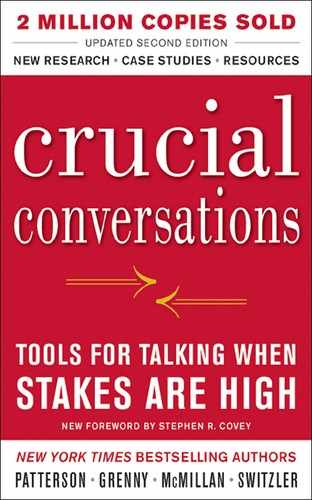KERRY
After a decade of talking with people who have read Crucial Conversations, I’m always surprised at the number of individuals who suggest that the book has helped them immensely, yet when I ask them what specific part has been of most assistance, they hesitantly explain that they haven’t exactly read the entire book. As I press further, many indicate that they haven’t read much of the book at all—okay, they’ve only scanned the book—but somehow the title, cover, headers, and first few pages have served them well. And they aren’t kidding. A quick glance has helped them enormously.
How could this be? As I probe further, I learn that the simple idea—that some conversations are so important that they deserve a special title and treatment—reminds individuals that as they step up to high-stakes conversations, they ought to be careful. Instead of becoming frightened or upset and then degenerating into their worst selves, they ought to bring their best conversation skills into play.
It’s not as if your typical readers are bereft of communication skills. They weren’t raised by wolves. When a discussion digresses, they can listen better. That they get. They can be thoughtful and pleasant, and they can most assuredly avoid harsh language and terse accusations. All of this, of course, is within their current skill set.
This means that readers don’t have to study every concept and skill contained in this book before they risk speaking their mind. Many come armed with communication skills. And now, after a brief exposure to the book, they’ll be even better prepared. More specifically, if they’ll simply note when they’re entering a crucial conversation and then do their best to avoid transmuting into a troglodyte, they’ll be just that much more likely to succeed.
The reason I find this response so refreshing is because it offers so much hope. You don’t have to read every syllable contained in this book, go into intense training for months, and then emerge with the minimum skill set to survive a crucial conversation. When it comes to high-stakes and emotional conversations, it’s not an all-or-nothing proposition.
For some readers, a simple reminder that they have moved from a casual discussion to a crucial conversation helps them to be on their best behavior. For others, the idea that they can catch themselves going to silence or violence, apologize, and start over helps get them on track, even when they’ve started off on the wrong foot. Some have found that restoring safety now permeates their every interaction. Still others find value in not telling ugly stories.
Of course, learning and applying more communication skills better prepares one to deal with a variety of situations. However, if you want to get started with crucial conversations, grab but one idea from this book and bring it into your next high-stakes interaction. It may be just what you need to find a way to speak your mind and make it safe for others to do the same.
